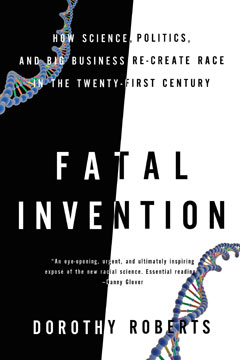Q&A with Dorothy Roberts
Penn Current: News, ideas and conversations from the University of Pennsylvania
2014-10-16
Greg Johnson, Managing Editor
When Dorothy Roberts was 3 months old, she moved with her parents from Chicago to Liberia, where her mother, Iris, had worked as a young woman after leaving Jamaica.
It was the first of Dorothy’s many trips abroad, and one during which her father, Robert, took a bunch of photographs and filmed home movies with his 16-millimeter camera. The Roberts family moved back to Chicago when Dorothy was 2, and she can recall weekly screenings of the 16-milimeter reels from Liberia in he living room.
“I had a very strong interest in learning about other parts of the world from when I was very little,” says Roberts, the 14th Penn Integrates Knowledge Professor. “My whole childhood revolved around learning about other parts of the world and engaging with people from around the world.”
Robert was an anthropologist and Iris was working on her Ph.D. in anthropology when Dorothy was born. They raised their daughters as citizens of the world in a home filled with a wealth of books and ethnographies about different cultures, places, and people. The Roberts home stayed connected with the international community, hosting foreign-exchange students and living overseas.
Five-year-old Dorothy had already decided she was going to be an anthropologist—as her parents expected—and would sneak into her father’s office and spend hours reading his books. The family spent two years in Egypt when she was a teenager, reinforcing her status as a global citizen.
Twenty-one-year-old Dorothy, after finishing her undergraduate studies at Yale, including a year in South America, decided she wanted to be a lawyer, and enrolled at Harvard Law School.
“I got a law degree and went into legal practice because I thought that was the best tool for doing social justice work,” says Roberts, who has joint appointments in the Departments of Africana Studies and Sociology in the School of Arts & Sciences and Penn Law School. Her work focuses on gender, bioethics, health, and social justice issues, specifically those that affect the lives of children, women, and African Americans.
Roberts began her legal career with one of the icons of the Civil Rights Movement, Judge Constance Baker Motley, for whom she clerked in the early 1980s. After practicing law in the private sector, she started her teaching career in 1988 at Rutgers University School of Law-Newark, an institution known for its history of social justice advocacy. She was a professor at Northwestern School of Law before joining Penn in 2012.
The Current sat down with Roberts in Penn Law’s Golkin Hall for a conversation about her globetrotting, her influential parents, racism in the child welfare system, the degradation of black bodies, the resurgence of race in science, and controversial decisions by the United States Supreme Court…
…Q.Your most recent book, ‘Fatal Invention: How Science, Politics, and Big Business Re-create Race in the Twenty-first Century,’ examines the resurgence of biological concepts of race in genomic science and biotechnologies. What is it about?
A. Biological explanations have historically been a powerful way of convincing people that social inequality is natural and, therefore, does not require social change. To me, that is what the eugenics movement, which was prominent in the United States from the 1920s until World War II, was all about. Mainstream science in the United States promoted biological explanations for social inequality, claiming it resulted from differences in people’s inherited genetic traits. That basic ideology continues to this day in what is seen as cutting-edge and sophisticated scientific research. You can tie together all of my work from ‘Killing the Black Body’ to ‘Fatal Invention’ as uncovering the ways in which that basic philosophy—disguising social inequalities as biological ones—continues to fuel unjust social policies and legitimize very brutal practices against the most marginalized people in this country, blaming them for their own disadvantaged status. How can you blame the least powerful people for creating powerful systems of inequality in the United States? But the biological explanation for inequality deludes people into thinking that is possible—that it’s natural for black infants to die at two or three times the rate of white infants; it’s natural for black people to be incarcerated at many times the rate of white people; it’s natural for black children to have lower graduation rates than white children; it’s natural for black people to have a fraction of the wealth white people have. Americans who don’t want to explain these glaring inequities as stemming from institutionalized racism find comfort in explaining them as stemming from a natural order of human beings…
…What are you currently working on? I understand you are continuing a research project that was originally started by your father.
A. I’m working on a book using about 500 interviews of black/white couples that my father conducted in Chicago from 1937 to 1980. He was working on a book on interracial marriage my whole childhood but he never wrote it. My father was white and my mother was black. I want to take advantage of this extraordinary archive to study the relationship between the experiences and views of these couples and the intensifying challenge to the racial order that occurred during that period. How did they understand their own marriages in terms of changing race relations and politics in Chicago? I’m very interested in the role interracial marriage has played in perpetuating and contesting racial inequality.
While my father believed that interracial marriage could be a key strategy for overcoming racism, I neither glorify nor ignore its political significance. I am investigating interracial marriage from the perspective of black-white couples without assuming an inherently problematic or progressive role in the advancement of racial equality. And I’m very excited to explore what the interviews reveal.
Read the entire interview here.

